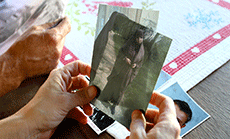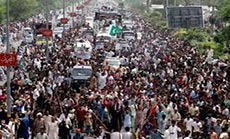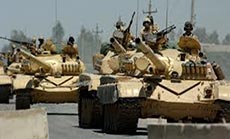
US Intelligence in the Investigation, KSA: Truth or Stability

As the accusation fingers are directed to the United States and the Zionist enemy on the politicization of the Special Tribunal of Lebanon, the latter is to be used as a tool to put pressure on Hizbullah and Syria in order to enable "Israel" to perform what could not be achieved on the ground.
"Wikileaks" documents published by "al-Akhbar" newspaper shows clear cooperation between the International Tribunal and all of US, Britain and France on one hand, and the begging of Prosecutor in the tribunal Daniel Bellemare to get help from US intelligence in order to develop what he called a legal guide to which his indictment is based, on the other hand.
The U.S. cables were capable of showing the size of Arab leaders' complicity with the West against Syria and how they marketed that Syria carried out the assassination of Hariri, even before the investigation was completed.
Bellmare Asks US Support
In the details, Bellemare stressed according to a telegram No. 08BEIRUT350 issued on the seventh day of March 2008 and classified by the U.S. ambassador at the time Michel Sison that "the size of the work of investigation Commission on 21 cases is so massive (the assassination of Hariri in 2005 and 20 other cases)
The commission examines similar investigations, such as FBI investigation in the attack of al-Khobar Towers, in an effort to understand how to manage its and how to win the cooperation of local authorities and the international community.
As he warned that time is essential to the process of investigation, Bellemare reiterated his call to get help from various States that might provide intelligence information and temporary experts for work on the ground.
As a prosecutor, he needs intelligence information received by the Committee in the form of normal tips that enable him to develop a legal guide to which he can base his indictment decisions once he puts the hat of "General Attorney".
"Intelligence centers might provide us with advice and might guide us to the place we should look in and what place we should avoid," Bellemare said providing the example of international crimes in former Yugoslavia, where a tip from a source on the existence of video footage was followed and then the tribunal was able to find this important guide.
For example, Bellemare continues "the Commission has footage of potential witnesses that must be identified, but security reasons prevented their publication," to conclude that the "United States can provide assistance through the activation of network informants to identify these people."
Bellemare pledged that he will do his best although he needs the US support. "To put the hook in an attempt to find out what you will get is a good thing, but at some point you need to know what you are going to hunt."
Bellemare reiterated that the general list which includes types of needed assistance was an attempt to make it easier to obtain the approval of Member States.
At the level of staff, Bellemare said that the "US can provide assistance through the provision of experienced investigators to conduct routinely police interrogations on Lebanese territories."
He proposed to leave for Washington on April 9 to meet with officials of the U.S. government, adding that he would be "grateful if he would be able to meet with high-level and influential officials."
Request for Implementation
Bellemare wants to visit Washington on April 9, the day after the delivery of his report to the Security Council of the United Nations. The Charge Daffairs calls to have meetings (at the minimum level) with Assistant Secretary of State for the Near Eastern Affairs Office, and Assistant Secretary of State for International Organization Affairs. "We also strongly recommend a meeting with Secretary of State or her deputy, if possible."
She also requested meetings with investigators from the National Security Council, FBI and Drug Enforcement Administration at the highest level if possible.
"It would also be useful to that a member of the FBI delegation headed by FBI Director Mueller visit Beirut to meet with the International Commission of Inquiry on the sidelines of the upcoming visit of the Director Mueller to Amman," she recommends.
"On aid, the agencies in Washington urge to meet the demands of the International Commission of Inquiry, particularly in relation to the provision of interrogators and intelligence sharing," Charge Daffairs ends her recommendations at this point.
According to another cable with the number 08BEIRUT996 and the date of the ninth of September 2008 classified from the Charge Daffaires William Grant, Grant accompanied by the Legal Attaché and one of the diplomatic politicians in the Embassy, met on the ninth of July the Chairman of the International Commission of Inquiry, Daniel Bellemare, at the headquarters of the Commission in Monteverdi.
When asked about his recent trip to Paris, Bellemare refrained from going into details, but confirmed to the Charge Daffaires the French support for the Commission and the Special Tribunal is strong revealing that the proportion of French officials support to him reached 120%.
Even if it turns out otherwise later, Bellemare announced that he would go ahead and that nothing will stop him but the Security Council of the United Nations.
Bellemare said: "France is unable to provide assistance similar to those provided by the U.S. Justice Department and Scotland Yard, because most of the French investigators lack mastery in the English language, and therefore, according to Bellemare, France will provide other types of support."
Praise to US Support
Bellemare praised much Paul Coffey, the investigator from the US Department of Justice, who was recommended by US government and had recently joined his team. He told us that he still needs criminal analysts.
Answering the Charge Daffaires on the status of the investigation, Bellemare disclosed that to some extent of the investigation, he did everything he could through search, and now hopes to activate eavesdropping service on all ground telephone lines. In Lebanon, eavesdropping falls in the authority of the Lebanese army intelligence or internal security forces.
Bellemare feared leaks from these two sides.
US Arabs Confront Syria
In parallel, a report issued by the U.S. Embassy in Cairo (05CAIRO9134 Date 7 December 2005) mentions details of the meeting between Syrian Foreign Minister Farouk al-Shara and Egyptian President Hosni Mubarak on 6 December in Cairo, as reported by the Egyptian presidential adviser Suleiman Awad.
"Awad said mediator asked Mubarak to play the mediator role between the Syrian President, and the French President Jacques Chirac and to convince the Saudis to reject a presidential statement that might be issued by the UN Security Council after Mehlis second report."
Awad added that Mubarak refused to respond al-Shara request:
He said that Syrian cooperation (with the International Commission of Inquiry) was until recently below the level, but Mubarak praised the Syrian step to send witnesses to Vienna for questioning.
Mubarak said that "Syria relied heavily on Russia," adding that "to prevent the issuance of a resolution or presidential statement by the Security Council would be impossible."
According to the report, al-Shara asked Mubarak to help ensure that the tribunal that will be established to try Hariri's killers will not be international, but rather belong to the Arab States League".
Awad said that Mubarak also refused to respond to this request, saying that "discussion of the tribunal was premature and demonstrates the recognition of being guilty."
Awad added that afterward "Mubarak asked al-Shara asked if Syria had killed Hariri." However, al- Shara asked to hold an Arab summit, but Mubarak replied that Algeria (as the current presidency) has refused to do so.
When asked to have a mini-Arab summit, Mubarak rejected the idea clarifying that "Egypt and Saudi Arabia can only help Syria if Syria fully cooperates with the Mehlis."
Saudi Arabia: Truth or Stability
In addition, the official at the French Foreign Ministry, Herve Bazansno revealed during a meeting with diplomats from the U.S. Embassy in Paris on 17 December 2005 the Saudi position, as quoted by its ambassador in Beirut (Abdel Aziz Khoja) to his French counterpart Emié (05PARIS8544 date of 20 December 2005).
According to what the Americans quoted him, Bazansno said: "The Saudi pessimism on the developments in Syria and Lebanon is growing." adding that the Saudi ambassador spoke of "concessions that U.S and France may need to conduct with Damascus."
Khoja concluded that "the international community may be in a position to choose between the truth on one hand and stability on the other hand, in the sense that we all know that Hariri's assassination could not happen without the knowledge of Bashar al-Assad, but there is no alternative to Bashar in Syria."
A Secret Jordanian Visit
A report issued by the U.S. Embassy in Amman, Jordan (05AMMAN9329 date of 1 December 2005) indicates that the advisor to King Abdullah II to National Security and the Mandate President of the Jordanian government, Marouf al-Bakhit made a secret trip to Damascus during the last week of November ( 2005) in order to convey a message to President (Bashar) al-Assad.
Bakhit presented to the ambassadors of the (G8), including U.S. Ambassador to Jordan David Hale, and the ambassadors of EU countries the results of his trip during a lunch with the king.
He told al-Assad that " there is no option for the regime in Syria but to cooperate fully with Mehlis investigations (Chairman of the International Commission of Inquiry in the assassination of former Prime Minister Rafik Hariri, Detlev), and that he should fully implement all relevant Security Council resolutions."
Explaining to al-Assad that "the king of Jordan personally wants to know who killed his friend Rafik Hariri," al-Bakhit got an answer from President al-Assad that "he wants to cooperate fully, but he needs the Jordan help on legal proceedings related to Mehlis investigations with Syrian officials."
Bakhit stressed, according to the U.S. report, that "he didn't reveal to al-Assad that there is another choice that allows him to provide anything less than full cooperation with the Mehlis."
The report adds that "Bakhit's secret visit prevented the Syrians to announce it as if it falls in the line of Jordanian support toSyria."
Change in Qatari Position
Under the title "Qataris see the truth in the Mehlis report, but they are cautious», a report of the U.S. ambassador in Doha Shays Ontrmir reveals facts of a family dinner with Emir of Qatar Sheikh Hamad Bin Khalifa al-Thani (05DOHA1779 Date 24 October 2005).
Ambassador began his report by saying that Sheikh Hamad "did not defend (Syrian President Bashar) al-Assad". The report added: "In the past, when the U.S. officials asked the prince on Syria, he strongly defended al-Assad, adding that the "U.S. must support him to confront those who were close to his father."
Ontrmir concluded that "the Prince answer is essentially an acknowledgment that the father and the son share the same close circle to them."
The prince said that the United States will harm itself if it interferes in Syria, but later added that it is unlikely that US makes such an intervention."
Ambassador Ottrmir continues in his report: "the senior Qatari officials met their Syrian counterparts during the last year to play a mediating role in relation to Lebanon and the United States. It is interesting that the Syrian President had spent six hours with Qatari Prince during the month of July of this year (2005).
"To install the political efforts, Qatar signed a memorandum during the same month for the establishment of an investment company with a capital of a hundred million dollars to increase investments in Syria," the US Ambassador added to conclude the following: "The special Qatari diplomatic efforts may have changed its course, and the position of the country in the Security Council would be in the interface."
Amr Moussa's Conditions:
For his part, the Secretary-General of the Arab States League Amr Moussa revealed during his meeting with U.S. Ambassador in Cairo Francis Rchiardoe the facts of his discussion between with President Bashar al-Assad on 15 November 2005 (05CAIRO8617 Date November 15, 2005).
Moussa said that when he met with al-Assad before his last speech, "he promised to have full cooperation with the Mehlis, and that he will say to any senior official called for an investigation to cooperate, but he could not send anyone to be investigated in Lebanon sinse it is offensive and non-secure ."
Moussa clarified to ambassador Rchiardoe that "al-Assad told me he would prefer that the investigations are made in the UN centers in Syria, which raises the flag of the United Nations and the Syrian President asked about the possibility of using the Arab League headquarters for this purpose."
Moussa answered according to US telegram that there are four conditions for this: "first Mehlis approval, secondly, the Egyptian government's agreement, Lebanese agreement, and fourthly, to an official Syrian request to the Arab League to use its headquarters."
Source: Al-Akhbar Newspaper
Comments

FBI: US Girls may Have Tried to join ’ISIL’
9 years ago

